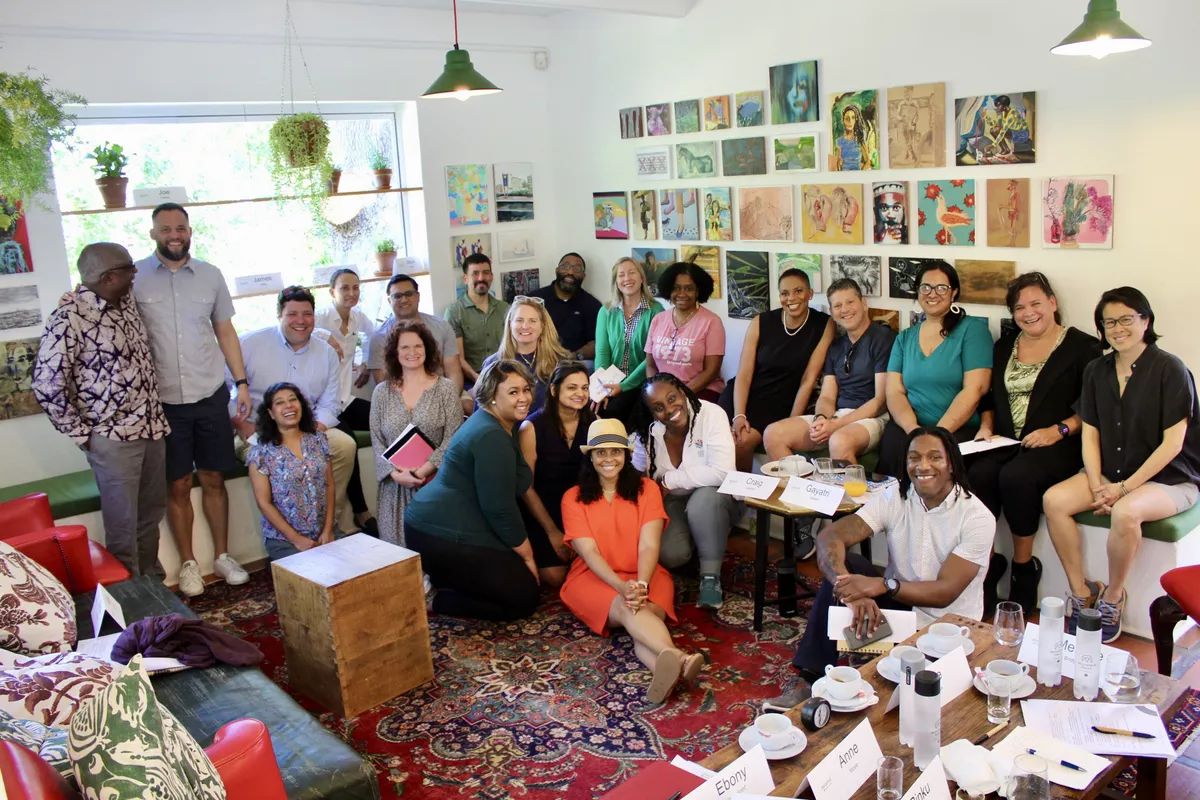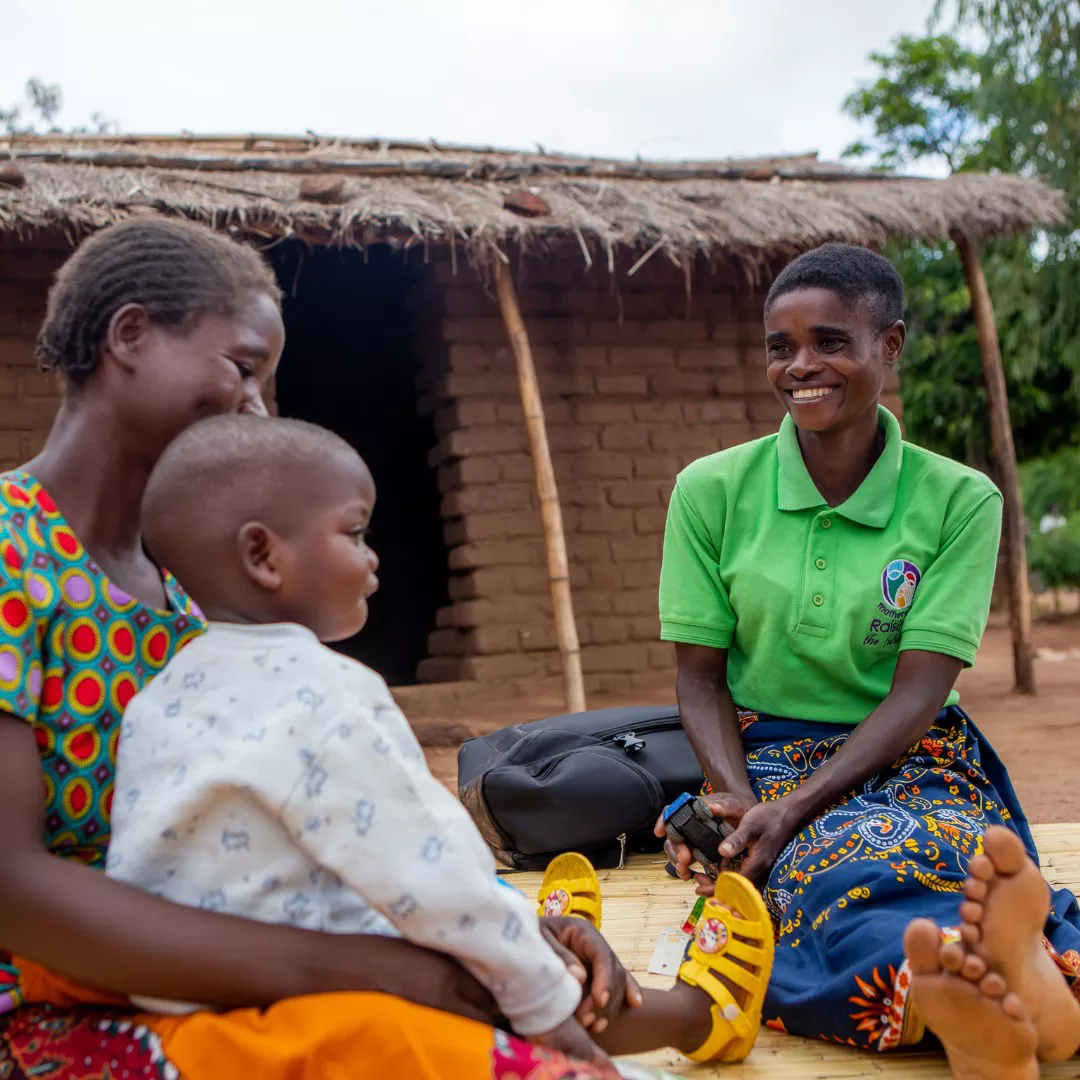👋 Welcome to Starting Early. Every other week, we spotlight new reports, useful news, engaging interviews with people doing important work, and interesting takes on maternal health and early childhood development issues.
In March, Burke Foundation Executive Director Atiya Weiss and 17 other thought leaders concluded their Aspen Institute Ascend Fellowship with an inspiring week of learning, reflecting, observing, and laughing in Cape Town.
The fellowship supports leaders dedicated to a two-generation approach to build family prosperity in the US. The experience made Atiya an even stronger advocate for promoting the health and wellbeing of parents and investing deeply in the village of support for families.
She was moved by learning about Ubuntu, the South African philosophy that means “I am, because we are.” Ubuntu provided a framework for resistance and healing in the face of apartheid, recognizing that all people are interconnected and that the wellbeing of one is linked to the wellbeing of all. This encouraged South Africans to stand in solidarity and build strong communities grounded in mutual support and respect.
Atiya reflects, “We have so much to learn from South Africa as we strive to forge meaningful relationships, promote belonging, and build community power in the US. Meeting fiercely determined, passionate leaders facing some of Africa’s biggest challenges – HIV/AIDS, mental health, climate change – put into sharp perspective our work, hope, and unity with each other.”
Read on and click the links to go deeper.

1. Making waves in youth mental health🌊

Trauma can cause lasting harm to physical and mental wellbeing – and it’s very common. A study of South African young adults found that 88% reported experiencing at least one adverse childhood experience (ACE) – a potentially traumatic event that happens before age 18. In comparison, two-thirds of US adults report experiencing at least one ACE. Such trauma can contribute to:
- Heart disease
- Chronic pain
- Mental health disorders
Young people in South Africa also face high unemployment rates; 63.9% of 15- to 24-year-olds and 34.5% of 25- to 34-year-olds were unemployed in early 2022.
Yes, but: It’s possible to prevent or reduce the harmful effects of ACEs through positive, healing relationships.
Located along False Bay in Cape Town, Waves for Change harnesses the power of positive relationships through weekly surf therapy sessions for young people in under resourced communities who have experienced trauma and other mental health challenges. The program aims to provide a safe space to develop resilience, self-confidence, emotional wellbeing, and protective relationships through surfing, movement, music, and other activities. Waves for Change also offers education and support to parents and caregivers so they can better understand and respond to the children’s mental health needs.
- By the numbers: Since its 2009 founding, Waves for Change has reached over 1,000 young people a year across South Africa and expanded to 11 other countries.
- A very special organization: Ascend fellows were moved by Waves’ approach to getting children who can’t swim to brave the choppy ocean. They walk in, arm-in-arm, and if any participant feels uncomfortable, they all fall back. They do it together.

Our thought bubble 💭: What if more youth-focused organizations, sports, and after-school programs were trained in mental health support and became spaces for healing and building positive relationships?
2. The next generation of eco warriors

Growing up in Gugulethu, near Cape Town, Xoli Fuyani saw the environmental inequality in her community and developed a passion for the natural world. An educator, she partnered with the Earthchild Project to provide environmental education at under resourced schools in Cape Town and founded Black Girls Rising – an eco-club where girls learn how climate change threatens their communities that has empowered over 1,500 young climate-change activists.
Supporting young leaders: Prior to her own activism, Xoli didn’t see a space for herself in the environmental movement. But, recognizing the need to advocate on behalf of her community and future, she works to amplify the voices of young girls within the movement.
- Black Girls Rising’s workshops include yoga, mindfulness, and communication skills centered on being community changemakers. Facilitators help students balance their emotions, own their power, and trust their inner wisdom.

Our thought bubble 💭: What happens when those at greatest risk of, and most affected by, climate change are centered in the conversation?
3. A sustainable peer-to-peer support system

An estimated 7.5 million South Africans live with HIV. If the virus is properly managed, those diagnosed with HIV can live long and healthy lives. Unfortunately, stigma and misconceptions prevent many from seeking or continuing treatment. Untreated, HIV can lead to AIDS – the late stage of HIV infection.
- PrEP pills prevent HIV, but the difficulty of daily treatment and fear that the pills are mistaken for HIV medicine can prevent their use.
A peer support system: mothers2mothers (m2m) employs and trains women with HIV to become “Mentor Mothers” who provide essential health education, support, and advice to pregnant women and new mothers who also live with HIV. Besides peer support that reduces isolation and offers hope, the m2m model provides Mentor Mothers with salaries and benefits – increasing their financial security.
- In health clinics and community settings, Mentor Mothers provide one-on-one support, group sessions, and home visits to women and families. They offer education and support on such topics as maternal and child health, HIV prevention and treatment, infant feeding, and family planning.
Through their work, Mentor Mothers help reduce mother-to-child transmission of HIV, increase adherence to antiretroviral medication, and promote overall health and wellbeing for mothers and their families. The Ascend Fellows learned from Nakululombe Kwendeni, senior technical advisor at mothers2mothers, how the organization scaled to 10 countries, serving over 1.6 million people in 2021.

Our thought bubble 💭: How can other peer-to-peer models supporting underserved communities learn from mothers2mothers and pay community health workers sustainable wages and benefits?
4. One smile to go: Reflections on Ubuntu 😀
It’s hard to think about South Africa without thinking about two of its most famous sons: Nelson Mandela and Bishop Desmond Tutu. Both embodied the idea of Ubuntu by emphasizing the interconnectedness and interdependence of all people and promoting empathy, compassion, and a sense of responsibility toward others — encouraging people to work together for the common good. Both were also prominent anti-apartheid activists.
- Apartheid was the policy of legalized racial segregation institutionalized by the Afrikaner National Party in 1948. Black and white people were legally forced to be Despite the end of apartheid in the early 1990s, its impact is still felt today in the form of health, socioeconomic, and political disparities between white and Black South Africans.
As apartheid divided people of different races in South Africa, the philosophy of Ubuntu invited them to find kinship in shared humanity.
South African psychoanalyst Dr. Elane DeVos explains that Ubuntu is an intuitive concept expressed through human relationships. It articulates people’s interconnectedness, our common humanity, and the responsibility to each other that flows from this connection.

The roundup
Learn about upcoming events, new funding opportunities, and jobs in maternal and infant health and early childhood:
- An inside look: Tiana C. McCoy, senior associate at Ascend, shares a detailed account of the Ascend Fellows’ trip to South Africa along with photos, stories, and inspiring quotes.
- Two paths to global health solutions: The Robert Wood Johnson Foundation’s Learning Across Global Borders initiative highlights successful health models from around the world and explores how those ideas can address US challenges. After 10 years of community health work in sub-Saharan Africa, the Community Health Acceleration Partnership shifted its efforts to the US using lessons learned from its global work.
- Driving global progress in maternal and child health: The International Maternal Newborn Health Conference 2023 will take place May 8-11 in Cape Town, South Africa. Stakeholders from around the world will highlight women’s priorities and commit to addressing preventable maternal and newborn deaths.
- Improving Black maternal health: The Perinatal Health Equity Initiative will host the Birth Equity Conference in Newark, NJ, May 19-21. Register here.
